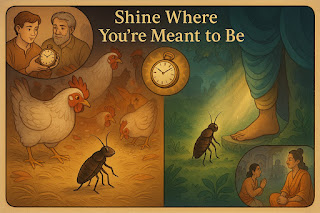Life IS God’s Divine
Play.
Hinduism envisions
life as God’s Leela (a play), a divine drama orchestrated by the
Supreme, where each soul plays a unique God-given role. As Shakespeare wrote in
As You Like It, “All the world’s a stage, / And all the men and women
merely players.” In the Hindu perspective, this stage is a sacred performance
where every individual contributes to God’s cosmic narrative, weaving purpose
into existence.
The Cosmic Stage and
Our Roles.
In this divine Leela,
every life is a scene in God’s eternal drama. Like a play with varied acts, our
lives are interconnected moments in the divine unfolding. Farmers toiling, students
studying, warriors defending, or devotees praying—all fulfil their dharma
(sacred duty). No role is superior or inferior; each is vital to the cosmic
harmony of the whole. The Bhagavad Gita illuminates this through Lord
Krishna’s counsel to Arjun, a warrior hesitant to fight family and friends on
the battlefield of Kurukshetra. Krishna advises:
Karmanye Vadhikaraste
Ma Phaleshu Kadachana
Ma Karma Phala Hetur
Bhur Ma Te Sango ’Stv Akarmani
(Bhagavad Gita
2.47)
Meaning: “You have
the right to perform your dharma (duty), but not to its fruits. Do not
be driven by results or avoid inaction.” Krishna urges Arjun to embrace his
warrior role without attachment to outcomes, teaching us that true fulfilment
lies in playing our part in God’s Leela with dedication, free from
expectation.
The Trap of
Comparison.
Yet, we often
falter, envying others’ roles as easier or more glamorous. The artist may covet
the ruler’s power; the labourer may feel overshadowed or the housewife’s
sacrifices go unnoticed by loved ones. Such comparisons, rooted in maya
(illusion), obscure our duty. In God’s Leela, every role – whether in
the spotlight or backstage - is essential. The stagehand’s precision matters as
much as the lead’s performance. Gita teaches that liberation comes from
surrendering to our role, trusting the divine Director’s perfect casting.
Hanuman and Karma
Yoga in Treta Yuga.
In Treta Yuga
(the silver age/era), Hanuman Ji, Lord Ram’s devoted follower, exemplifies Karma
Yoga (selfless action). In the Ramayan, Hanuman leaps across oceans,
carries mountains, and battles demons for Ram, seeking no reward or respite. He
never envies others, like Lakshman or Sugreeva, nor deems his tasks burdensome.
His selfless service, driven by unwavering devotion, shows Karma Yoga:
performing duty, playing your role, with complete surrender to the divine,
unattached to personal gain or others’ apparent ease.
The Gopis and Bhakti
Yoga in Dwapara Yuga.
In Dwapara Yuga
(the bronze age/era), the Gopis of Vrindavan embody Bhakti Yoga
(devotion) through the Rasa Leela (divine dance) with Lord Krishna.
Drawn by his enchanting flute, they abandon duties, homes, and egos to dance
with Krishna, seeking only the joy of his company. Each Gopi feels Krishna is
hers alone, yet dances harmoniously with the other Gopis, blending individual
and collective devotion. Their selfless love defines devotion, offering their
hearts to God without expectation, showing Bhakti Yoga: playing your
role with complete love to the divine, unbothered by the blessings of others.
Our Role in Kali
Yuga.
In Kali Yuga
(the iron age/era), our age of material and spiritual challenges, we blend
Hanuman’s Karma Yoga (selfless action) with the Gopis’ Bhakti Yoga
(devotion). Unlike Treta Yuga, where Hanuman served physically, or Dwapara
Yuga, where the Gopis danced with Krishna under moonlight, we navigate a
world clouded by distraction. Yet, our dharma (duty) -as parents caring,
workers serving, or students learning - calls us to act selflessly and
lovingly. Krishna’s flute echoes through our daily responsibilities – calling
us to play our role. A nurse tending patients, a mother caring for her family
or a teacher inspiring minds—each act, offered to God with love but without
attachment, becomes sacred, weaving us into the divine Leela.
Realizing God
Through Our Role.
Realizing God, or moksha
(liberation), is achieved by playing our part in this Leela. Through Karma
Yoga (selfless action), like Hanuman, we focus on duty. Through Bhakti
Yoga (devotion), like the Gopis, we act with love. A devotee sweeping a
temple, a parent nurturing a child, a farmer ploughing his fields, a lawyer
defending her client, a mother cooking for her family or whatever other role we
may play, when done as an offering - becomes sacred. As Krishna teaches, it’s
not the nature of the role but rather the spirit in which we play our role that
leads to Him.
The Eternal Play
Continues.
Life, as God’s Leela,
is a dynamic drama. Our scenes - joys, struggles, triumphs, troubles - are
fleeting yet vital to the eternal narrative. By embracing our role with faith,
as Arjun, Hanuman, and the Gopis did, we glimpse the divine unity within the
play’s diversity. Let us heed Shakespeare’s insight and play our parts with
grace. In Kali Yuga, we are invited to act with Hanuman’s selflessness,
love with the Gopis’ devotion, and dance in God’s Leela, realizing we
are sparks of the Divine, forever part of the cosmic drama.
Jai Shri Ram! Jai
Shri Krishna!















